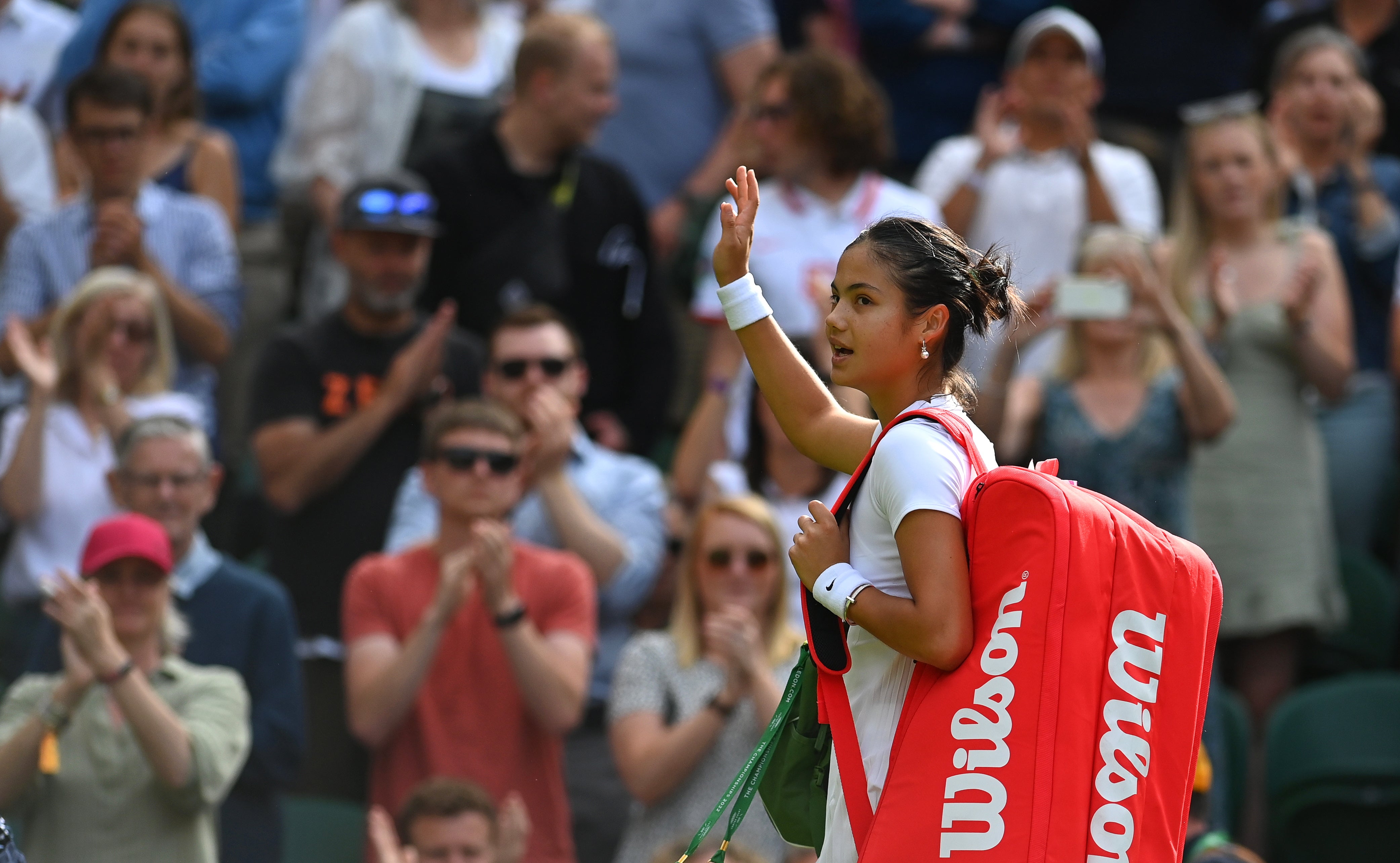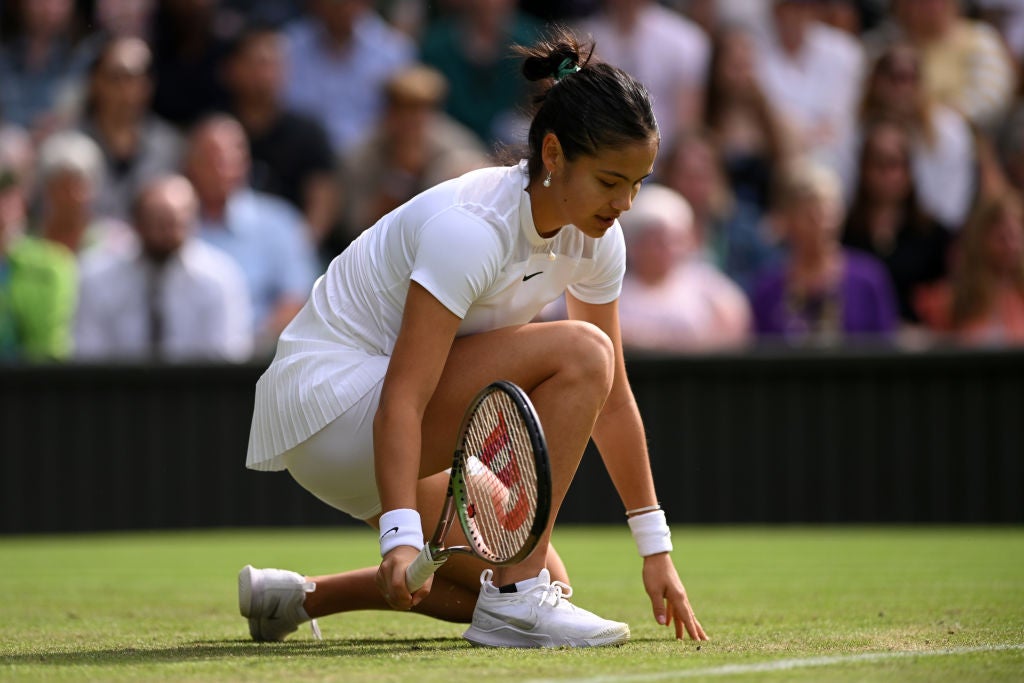Emma Raducanu knocked out of Wimbledon and overpowered by France’s Caroline Garcia
Raducanu came into Wimbledon cold and it showed as she struggled to gather her game on Centre Court against a powerful opponent

Your support helps us to tell the story
From reproductive rights to climate change to Big Tech, The Independent is on the ground when the story is developing. Whether it's investigating the financials of Elon Musk's pro-Trump PAC or producing our latest documentary, 'The A Word', which shines a light on the American women fighting for reproductive rights, we know how important it is to parse out the facts from the messaging.
At such a critical moment in US history, we need reporters on the ground. Your donation allows us to keep sending journalists to speak to both sides of the story.
The Independent is trusted by Americans across the entire political spectrum. And unlike many other quality news outlets, we choose not to lock Americans out of our reporting and analysis with paywalls. We believe quality journalism should be available to everyone, paid for by those who can afford it.
Your support makes all the difference.Before the final game, Emma Raducanu stood on the baseline in the evening sun as Centre Court gave one last prolonged howl of encouragement. It was offered without expectation – Caroline Garcia had already proven her dominance and her 6-3, 6-3 victory was sealed a few moments later – but was a welcome expression of support for a young player visibly struggling with her game.
A year on since her surge from anonymity to Wimbledon’s fourth round, with a US Open title in between, this second-round exit could easily be interpreted as Raducanu regression. Her serve was about the only part of her game flowing as the forehand chose unpredictable trajectories and her usually pinpoint backhand was no more consistent. The glimpses of magic, reaching impossible balls and returning them with feeling, roused a partisan crowd but were too fleeting to reverse the momentum. Service holds had to be hard earned, and when points descended into baseline slugfests Garcia’s superior power won out.
But it should be no surprise that the 19-year-old is still finding her feet in the professional ranks despite her achievements – or in spite of them given the added scrutiny she carries. Just appearing here at Wimbledon was something of a surprise given the side strain which forced her to withdraw from Nottingham earlier this month and then miss Eastbourne, where she had hoped to hone her grass game. There would have been no shortage of pressure, not least commercially, to appear in Wimbledon white this week even if it meant coming in cold – though Raducanu dismissed pressure itself as an excuse for her defeat.
“Yes, I have had attention,” she said afterwards. “But I’m a slam champion, so no one’s going to take that away from me. Yeah, if anything the pressure is on those who haven’t done that. There’s no pressure. Why is there any pressure? I’m still 19. Like, it’s a joke. I literally won a slam.”
A year on she was no longer an unknown quantity sneaking through the draw but a scalp to be claimed, a US Open champion to be toppled, on Centre Court no less. Credit must go to Garcia, her former top 10 opponent who rose to the occasion.
“I was preparing for this match really well,” Garcia said of her first appearance on Centre Court. “Emma is a huge player and in her home tournament and she proved she can do very well on the big stage. It’s fair that they support Emma and of course it a great memory for me and as always it is a lot of respect.”
Garcia certainly settled quickest, holding her serve before breaking with her very first look at Raducanu’s after a precision forehand to the baseline. Raducanu hit back instantly, beginning to gauge the imposing Garcia’s powerful ground strokes, replying in kind to force a series of mistakes and the break back.

The rhythm of the match was disrupted by a couple of poor line calls, both of which were correctly overruled by the chair umpire and in one case forcing a point in full swing to be replayed, and perhaps these moments knocked Raducanu’s concentration as she fell to another break midway through the first set.
That assessment fails to credit Garcia, who backed up the break with a confident hold to lead the first set 5-2, and although Raducanu saved a set point as she held serve, Garcia served it out with a dominant array of groundstrokes to clinch the first set 6-3. With that, Raducanu rushed off court to momentarily break the flow.
At times on her serve Raducanu was able to win some quick points, directing the ball to the furthest reaches of Garcia’s wingspan and dispatching anything that came back. But she struggled to get hold of Garcia’s powerful first serve, which averaged 107mph compared to the teenager’s 96mph.
Garcia broke first in the second set at the end of a long rally in which both players thrilled but ultimately Garcia found the winning shot, a familiar tale. Raducanu wasn’t done, battling to an immediate break back for the second time, but lost her serve once more the very next game to fall 4-3 behind, and from there Garcia closed it out despite Centre Court’s roars.
Raducanu will now go away and prepare for the final slam of the year in New York, the place where she stunned the world. On this evidence she needs time to refind that sharpness and surround herself with a settled team. She remains on the lookout from a full-time coach and has been working with childhood mentor Jane O’Donoghue in Wimbledon while the search goes on for the right permanent fit. Perhaps it was just her lack of match practice but at times she seemed to be coaching herself here, going through little sweeping motions with her hands in an effort to kindle some feel on court.
“I didn’t feel anything out there,” she said of her injury problems in the build-up. “I declared myself fully fit when I walked out onto the court on the first day. But I’ve played seven hours of tennis in a month,” she said. “To even compete with these girls at this level and win a round I think is a pretty good achievement.”
History tells us that young champions often take a step back before they bound forwards, and the example of the irrepressible new world No 1 Iga Swiatek – who won the French Open aged 19 before tumbling down the rankings – shows that eventually they can return. Raducanu will come again, this Wimbledon just wasn’t her time.
Women’s singles round-up
Harriet Dart is not allowing herself to think about what a good run at Wimbledon could do for her career. The 25-year-old became the 10th British player to make it through to the second round – the most since 1984 – as she beat Spaniard Rebeka Masarova 6-1 6-4 on Court 12.
Doing well at Wimbledon as a Briton can have major benefits in raising profiles and attracting possible sponsorships, but Dart is not considering that element.
“If I’m honest, it’s not something I’ve thought about,” she said. “For me, it’s just about going out there, doing the best I can. If I can keep winning matches, that’s great. Just being able to put a good level with each match is really important to me, just being able to consistently produce week to week a good level. I feel like the last few weeks I’ve really showed that.
“It’s just about doing more and more of that more often.”
Second seed Anett Kontaveit tumbled out in the second round, thumped 6-4, 6-0 by big-serving Jule Niemeier, who is making a mark on her first appearance at the Championships. And third seed Ons Jabeur of Tunisia hardly broke a sweat as she swept into round three with a 6-4, 6-0 thrashing of Poland’s Katarzyna Kawa.
Join our commenting forum
Join thought-provoking conversations, follow other Independent readers and see their replies
0Comments